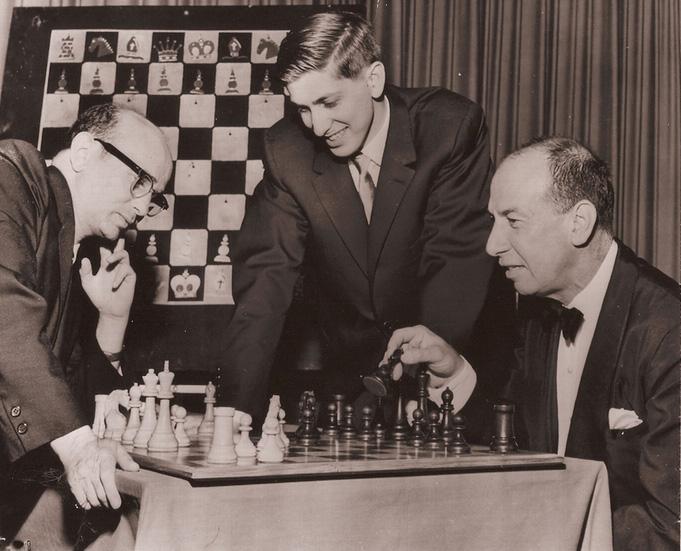
Fischer knocks himself out after 11 Rounds - S. Reshevsky VS R. Fischer (Round 11)

Caption attached to AP Wirephoto read: Los Angeles, Calif., Aug. 14--CHESS CHAMP AND CHALLENGER - Bobby Fischer 16-year old U.S. Chess champion (center) failed to show up for the 12th game in his match with Samuel Reshevsky (left), saying that 11am is too early to play chess. Game was forfeited to Reshevsky. They are shown playing a game with actor Jose Ferrer (right) before opening series of matches last week. (AP Wirephoto) (dab20400tms) SEE AP WIRE STORY 1961
(I believe Bobby was 18 at the time - not 16)
The 16 Game Match (organized by Jacqueline Piatigorsky) only went 11 Rounds before Fischer knocked himself out.
An account of this match, from Ralph Ginzburg's 1962 Harper's article on Fischer:
In a second highly publicized incident, just last summer, Bobby forfeited a sixteen- game, cross-country match to Reshevsky, because the twelfth game of the series was set for 11:00 A.M., an hour that Bobby regarded as uncivil for playing chess. Explaining this to me, he said that the match had originally been scheduled for play at the Beverly Hilton Hotel in Los Angeles on Sunday, August 13, at 1:30 in the afternoon. At ten that morning, he received a phone call from the referee of the game saying that playing time had been moved up to eleven. This, he said, was to accommodate the wishes of the principal patron of the series, Mrs. Jacqueline Piatigorsky, who wanted to be sure the game would be over in time for her to attend a concert to be given that night by her husband, cellist Gregor Piatigorsky. Bobby refused to play at that early hour and cited a clause in his playing contract which stated that playing time had to be acceptable to him. When Bobby failed to show up, the Los Angeles referee announced the game a forfeiture in favor of Reshevsky. The score of the series up to then had been tied at 5 1/2 games each. The forfeiture put Reshevsky ahead, 6 1/2 to 5 1/2.
The next game was to be played in New York four days later. Fischer refused to continue the series unless the forfeiture were first overruled. No one at the New York offices of the American Chess Foundation, sponsor of the series, was in favor of the decision of the Los Angeles referee and it was almost certain that in due time the forfeiture would be overruled. But Chess Foundation officials resented a threat to quit. "Fischer is holding a gun to our heads," the president, Walter Fried, told the New York Times.
When playing time for the thirteenth game arrived, the Chess Foundation had not yet overruled the forfeiture and Fischer did not show up for the game. The entire series was then declared a victory by default for Reshevsky and the trophy and prize money were awarded him. "There was no other course we could take consistent with our responsibility and our self respect," Fried said later. Bobby told me that in each of these cases he was merely "defending" his "principles." It is this rigid adherence to principle-to the point of self destruction-that seems to characterize almost all of his difficulties.
In an interview with Reshevsky that was conducted a few years before his death, he gives details of the game. According to Sammy, when the game was adjourned, Fischer had no doubt of the victory and declared that he would win. Reshevsky stayed up 'a little bit that night' and found the way to draw. The next day Fischer was disappointed.
Reshevsky says that this incident was the reason Fischer quit. This supposedly broke his spirit. When the interviewer raised the objection that Fischer was a great fighter, Sammy said: "Well it is something to declare that you will win but it is completely different when you say that you will and then get a draw."
In his book Fischer claimed he could have won by trading rooks on move 53. That would leave a 6-man endgame.
